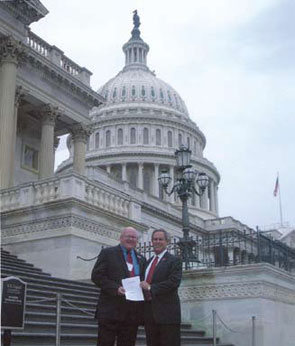
I can’t tell you how many times I have conversed with a colleague about the state of health policy and heard, “It’s broken.” I invariably have to ask, “What have you done to fix it?” Often times I get a blank stare or an excuse about how Congress doesn’t listen.
In order for us to affect meaningful change, we all must get involved and do something to benefit the future of medicine, our patients, and our profession. One easy way to do that is to attend the ACR’s Annual Advocates for Arthritis Capitol Hill Fly-In.
I have been participating in the ACR’s advocacy efforts for 20 years. Each year, I take two days off to go to Washington, D.C. to be briefed on rheumatology-related issues and to meet with my congressional delegation. Through these annual visits, I have developed valuable relationships with the South Carolina congressional delegation and their staff. However, as we saw in the 2010 elections, being the incumbent doesn’t guarantee you a win. This year, my attendance will be more important than ever because four of the six representatives from South Carolina are new to Congress. Yes, I will have to start my education efforts from scratch, but if I don’t go to Washington to talk to Congress about the importance of rheumatology, who will?
There are many issues Congress must address this year that will impact how we practice and treat our patients. Participating in Advocates for Arthritis gives rheumatology professionals and our patients the opportunity to tell our story and establish relationships in Congress. Many times I have seen staffers with relatives with rheumatic problems. They openly anticipate our yearly visit to glean information about the latest treatments that have been approved. With continued visits, Congress becomes familiar with rheumatology and our issues.
I continue to attend Advocates for Arthritis because the benefits of our advocacy efforts are apparent. We have seen reimbursements for bone density scans improved and support for pediatric rheumatology training enhanced. Our visits remind Congress of the important work taking place at the National Institutes of Health and that continued funding for rheumatic research is necessary. We, as rheumatology professionals, must continue to interact with Congress to tell them how these policies affect our ability to provide the best care for rheumatic patients.
Do you need to be a 20-year veteran to attend Advocates for Arthritis? Absolutely not. There are 112 newly elected U.S. representatives and senators. Most likely, these members of Congress know very little about rheumatology and the impact rheumatic diseases have on one’s quality of life. This September, we need to make sure that the message of rheumatology is heard in every congressional office across Capitol Hill. If you have not attended before, this is the perfect time to start. I hope to see you in Washington, D.C. September 19–20.

